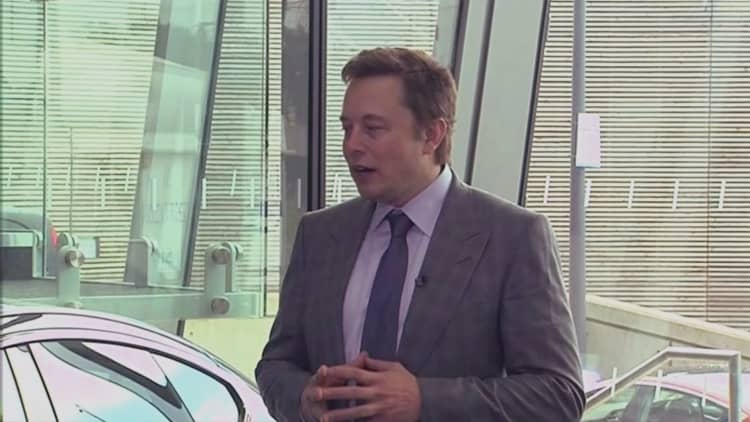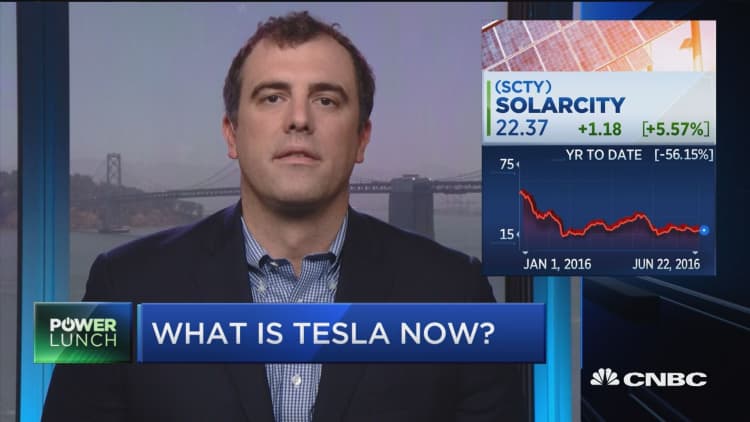
Elon Musk has won legions of fans with a string of successes that includes PayPal, Tesla Motors and SpaceX. But even that resume may not comfort investors concerned about his latest radical idea.
Musk has proposed that his electric car developer Tesla acquire solar panel installer SolarCity for $2.8 billion. He's the principal stakeholder of both, but has disqualified himself from the talks and said the deal will require support from a majority of "non-me shareholders."
That could be a problem because there's a ton of overlap between the two investor groups, whose holdings in Tesla are worth many billions more than their stakes in SolarCity. While SolarCity shareholders should love this deal — it represents a premium of up to 35 percent above where the stock was trading on Monday — those same investors fear that a merger could wreck their Tesla shares.
Investors voting with their wallets will need answers before getting behind Musk, the celebrated tech entrepreneur. It's a classic battle between Silicon Valley idealism and Wall Street pragmatism.
"Musk may learn that engineering electrons is easier than engineering elections," said Joseph Grundfest, a law professor at Stanford University and senior faculty member at the Rock Center for Corporate Governance.
Tesla shares plunged 10 percent Wednesday to $196.66, following the Palo Alto, California-based company's offer to purchase SolarCity for $26.50 to $28.50 a share. SolarCity, based 15 miles north in San Mateo, rose 3.3 percent to $21.88, closing well below the bid price, suggesting that Musk faces plenty of skepticism from the public markets.
Tesla & SolarCity
More than half of non-Musk shares in SolarCity are owned by investors who are also in Tesla. Those investors own roughly $950 million worth of SolarCity and $17 billion of Tesla, according to data from FactSet analyzed by CNBC.com.
Fidelity Management is the biggest institutional backer of both companies, owning 11 percent of Tesla and 15 percent of SolarCity. The Boston-based firm's Tesla stake is worth $3.2 billion, more than 10 times its SolarCity holdings and $1 billion more than SolarCity's total market capitalization.
A Fidelity spokesperson declined to comment.
Other big-name investors in both companies include Vanguard Group, Morgan Stanley Investment Management, BlackRock Fund Advisors and CTC myCFO, an affiliate of BMO Harris.
In a conference call Wednesday, Musk called the deal a "no-brainer" because Tesla and SolarCity are working to power consumers' lives with solar. Tesla has the cars as well as the Powerwall, which stores energy collected from the sun, and SolarCity brings solar to the home through a novel distribution and financing model.
"I'd really recommend voting in favor of this because I think anyone who doesn't vote in favor is going to be voting against the best interests," Musk said. "But we will certainly abide by the shareholder vote."

Musk added that he has "zero doubt" about the rationale of the deal, a position that's very much at odds with many analysts. Critics have gone so far as to call the takeover attempt a bailout of SolarCity, a company where Musk is chairman and his cousin, Lyndon Rive, is CEO.
At the end of the first quarter, SolarCity had $6.2 billion in liabilities and recorded a net loss of $283 million. Operating expenses were almost twice as high as revenue, so even though more consumers are rapidly turning to solar panels and away from fossil fuels, SolarCity is burning tons of cash to take advantage of the demand.
Short-seller Jim Chanos told CNBC that SolarCity's financial distress is "a burden that now Tesla shareholders will have to bear." Benjamin Kallo, an analyst at Robert W. Baird, said in a TV interview that Tesla investors who want to own a car company are being forced to "deal with the solar industry and a lot of the intricacies it contains."
Standpoint Research founder Ronnie Moas labeled the deal a "bailout of a company that Musk owns 20 percent of" and that was "on life support 24 hours ago."
Not to take anything away from what Musk has accomplished, Moas was quick to add that his criticism is strictly about this particular proposal.
"I can't even hammer a nail into the wall, so when somebody sends a rocket into space and does what he did, I have all the respect in the world for him," Moas said on CNBC's "Halftime Report."
Representatives from Tesla and SolarCity didn't respond to requests for comment.
Facing down detractors is nothing new for Musk. Every business he's started seemed crazy at the time. Even the venture capitalists who now talk glowingly of his accomplishments were mostly unwilling to pony up cash in the early days of his far-out projects.
As the Tesla-SolarCity deal plays out, expect to see plenty of reminders of how many times Musk has defied the odds, and how tech's current leaders Jeff Bezos and Larry Page so often ignored the rules of Wall Street to achieve success.
Start-up investor and entrepreneur Shervin Pishevar is currently working to help build Hyperloop One, an ultra high-speed transportation network, based on Musk's Hyperloop concept. Needless to say, Pishevar takes a different view of Musk's proposed deal than would a mutual fund manager.
"Elon is a visionary who will continue to reshape our world," Pishevar said. "Tesla and SolarCity together makes much strategic sense. I look forward to what the two companies together can bring the world."
Herb Greenberg of Pacific Square Research said the deal makes no sense for Tesla shareholders given the amount of debt it would add to the equation. All the excitement is around Musk.
"The whole story is about the hope and hype of the future," Greenberg said on CNBC's "Power Lunch." "It's the cult of Elon Musk."
— CNBC's Scott Wapner and Josh Lipton contributed to this report.


